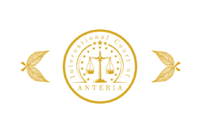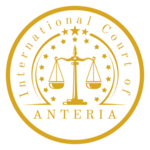The International Court: Difference between revisions
No edit summary |
|||
| Line 123: | Line 123: | ||
| {{flag|Zhousheng}} || 2020 | | {{flag|Zhousheng}} || 2020 | ||
|- | |- | ||
| {{flag|Iwonia}} || 2020 | |||
|} | |} | ||
Revision as of 20:44, 14 October 2020
This article is incomplete because it is pending further input from participants, or it is a work-in-progress by one author. Please comment on this article's talk page to share your input, comments and questions. Note: To contribute to this article, you may need to seek help from the author(s) of this page. |
International Court of Anteria | |
|---|---|
| Capital | Cartwright, Layfet |
| Type | judicial union |
| Leaders | |
• Chief Justice | Santiago M. Romero of Layfet |
| Establishment | |
• Charter of the International Court of Anteria | 4 January 2015 |
Website ica.int | |
The International Court of Anteria (ICA), sometimes known as the World Court, the Supreme Court of the World, or more simply - the International Court is an international governmental organization that settles disputes between its member states in accordance with international law and gives advisory opinions on other various areas of international law. The court's decisions are only binding to its member states, however it is on its member states to collectively work together to enforce the courts decisions. The court will occasionally hear disputes on non-member states, however these decisions are only advisory and non-binding. The court will also take no action to ensure enforcement of advisory opinions. Currently, the ICA is the only international court that adjudicates general disputes between countries, with its rulings and opinions serving as primary sources of international law.
The ICA was established on January 4th, 2015. The Charter of the ICA sets forth its purposes, rules, statues, format, and procedure. The ICA is a bench of 7 judges elected by delegates for twenty-year terms. The International Court is headquartered in Cartwright, Layfet
Members
| Nation | Year Joined |
|---|---|
| 2015 | |
| Template:Country data Layfet | 2015 |
| 2015 | |
| 2015 | |
| 2016 | |
| 2016 | |
| File:Halsuntrian Flag.png Halsuntria | 2019 |
| 2020 | |
| 2020 | |
| 2020 | |
| 2020 | |
| 2020 | |
| 2020 | |
| 2020 | |
| 2020 | |
| 2020 | |
| 2020 |
Seven Justices of the Court
| Justice | Nation | Term |
|---|---|---|
| Santiago M. Romero | Template:Country data Layfet | 2015-2035 |
| Tomas Jimæs Fijerbargen | 2016-2036 | |
| Yorik J. Nikafsha | 2016-2036 | |
| Friedrich A. Weidmann | 2020-2040 | |
| Lucía de la Armenta | 2020-2040 | |
| Mateo García Lopez | 2015-2035 | |
| Edmund Garner | 2020-2040 |
Selected Cases
| Name: | Case: | Date of Trail: | Charge: | Ruling/Sentence: | Notes |
| Logan J. Tours of Template:Country data Layfet | International Community v. Tours | 16 February 2016. | Terrorism (International) | Tours, the grandson of the former leader of the Template:Country data Stratocracy of Layfet had planted a bomb at the International Court of Anteria. The bomb went off and killed around 24 people working at the building. The court was not in session at the time. After his arrest, he was tried in the ICA under the Terrorism Clause. The Court ruled that Tours was guilty of Terrorism, concluding so after an investigation found particles relating to a bomb development site that Tours owned. The Court sentenced Tours to life in prison. He is current serving his Life-Sentence in Layfet. | Tours was the case that showed that developing international institutions needed security. As such, Layfet made efforts to increase security at all sites of international importance, including embassies. Defending these sites is now the primary duty of the Layfetian National Guard. |
| Lev Smirnov of |
International Community v. Smirnov | 7 August 2020 | Terrorism (Domestic) | Smirnov had committed a terrorist act in Kentalis which resulted in the death of 48 citizens. After his arrest, he was tried in the ICA under the Terrorism Clause. The Court ruled that Smirnov was guilty of Domestic Terrorism, reasoning that the overwhelming evidence was indisputable. The Court sentenced Smirnov to life in prison. He is current serving his Life-Sentence in Kentalis. | Smirnov was the case that solidified the Court's power to hear domestic terrorism cases. As during trial Smirnov objected to the court's jurisdiction arguing that his actions were an internal Kentalis mater. The court however unanimously defended its jurisdiction, holding that "parties to the charter intended all terrorism to be subject to this court's review" because "terrorism is such a grave act that concerns the international community as a whole, regardless of how localized it may be." |
| President Ander Starget of |
Member States v. Starget | 13 October 2020 | Torture and Violation of Human Rights | Starget had tortured 600 prisoners' of war and left them with inhumane conditions. These 600 prisoners' of war where members of the royalist faction of Neferheim during the civil war. When these facts reached the Court, they asked Starget to sumbit himself to the Court for a preliminary and investigation hearing. Starget did so and the Court order a joint Template:Country data Layfet- |
Starget is notable because of two different reasons. First, it was the first instance of the use of the plea deal in the international court. Secondly, it firmly established the court's power to order investigations. Though the Court previously could call for an investigation, it was up to independent parties to complete the investigation. In this case, the court assumed the power to order an investigation to commence because "the needs of many who suffer, especially in cases of torture, outweigh the interests of sovereignty when 'time is of the essence'". |
See Also
Eternal Links

